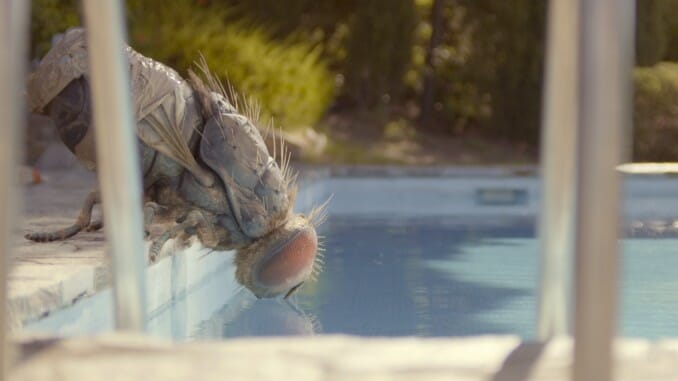Endearing and Surreal, Mandibles Is an Ode to All of Life’s Weirdness

A scenario of magical realism achieved as if through a scuzzy bong rip, French director Quentin Dupieux’s Mandibles follows two slacker friends who scheme to make some quick cash to scrape by with the friendly assistance of an oversized housefly. Though Dupieux’s previous films such as Rubber and Deerskin never shy away bloodshed and suffering, his latest effort is overwhelmingly defined by a sense of joie de vivre despite a typically surreal plot and the undeniable disaster left in its protagonists’ wake. The filmmaker’s absurdist comedy leanings are on full display, rendering Mandibles his most surprisingly exuberant film to date.
Unemployed and homeless, Manu (Grégoire Ludig) is fast asleep on the beach when he is propositioned by a frequent collaborator-in-crime to complete a very simple task: Pick up a briefcase from point A, drive it to point B and receive $500. Not one to turn down easy money, Manu manages to drive off in a beat-up set of stolen wheels. Instead of heading to the pick-up spot straight away, he decides to see if his best friend Jean-Gab (David Marsais), who works a dead-end job at a local auto body shop, might want in on the plan. Only 13 miles away from their intended destination, the pair notice a disconcerting noise coming from the back of the car. Upon inspection, the source of the thunking is revealed: An uncannily large fly is tucked away in the trunk, giving the friends an entirely new endeavor to set their sights on. Tired of having to fend for themselves, they decide to train the fly to go off and commit their crimes for them, leaving the two to hang back and “sit pretty” in the interim.
Bizarre but never confounding, Mandibles is a superbly executed tragicomedy. Manu and Jean-Gab navigate perilous incidents ranging from four-alarm fires to belligerent hostage situations, simply shrugging in spite of all of their fuck-ups and misguidance. The pair’s idle reaction to their misfortune only adds another veneer of hilarity to the already farcical plotline. When a case of mistaken identity grants the friends a chance to crash at a bougie vacation house on the coast, their oblivious hosts’ ridiculous insistence on politeness and good manners makes them appear far more deranged than the wannabe grifters and their enormous pet fly. Particularly when it comes to Agnès (marvelously performed by Adèle Exarchopoulos, best known in the U.S. as the star of 2013’s Blue is the Warmest Color)—a resident with a volume-control issue stemming from a ski-related incident that shouldn’t be funny, but certainly is—her insistence on adhering to textbook French civility despite a startling, brash tone indicates a certain commentary on an antiquated notion of politeness. The clashing class mannerisms become palpable as Manu and Jean-Gab grow increasingly comfortable in the swanky abode where they are clearly so out of place—a light touch from Dupieux that toys with notions of French gentility through situational awkwardness and comedic levity.
-

-

-

-

-

-

-

-

-

-

-

-

-

-

-

-

-

-

-

-

-

-

-

-

-

-

-

-

-

-

-

-

-

-

-

-

-

-

-

-








































